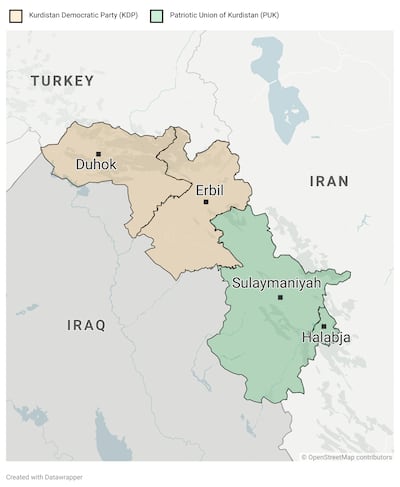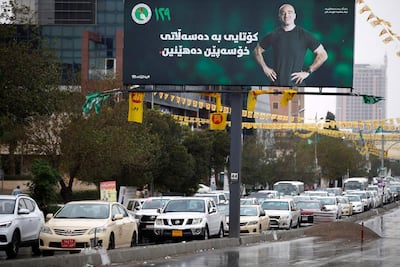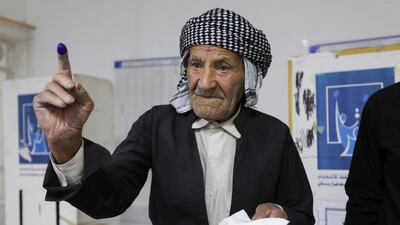Iraqi Kurds began casting their ballots on Sunday in the semi-autonomous Kurdish region of Iraq’s first parliamentary election since 2018 amid growing internal political rifts and tension between the governments in Erbil and Baghdad.
The polls have been delayed for more than two years due to disagreements between the two ruling parties, the Kurdistan Democratic Party (KDP) and Patriotic Union of Kurdistan (PUK), over the electoral law and commission, leading to criticism from the international community, which the Kurdish region has maintained good relations with.
After being postponed four times since its original scheduled date of October 2022, the elections come at a time of tension within the country as well as in the wider region. The parliament has been dominated by the two main parties but their inability to reach a solution and hold elections on time has placed the process under the federal government in Baghdad after a series of Supreme Court rulings.
The parliament’s term expired in 2022 and its self-extension vote by a year was ruled as “unconstitutional” by the court, rendering the Kurdistan Parliament defunct and unable to reactivate the region’s electoral commission. This allowed Iraq’s federal Independent High Electoral Commission (IHEC) to take control of the process, taking it out of Kurdish hands for the first time since the creation of the legislature in 1992.
For the first time, the Kurdish region will be divided into four constituencies: Erbil, Duhok, Sulaymaniyah and Halabja.
In another significant blow, the Iraqi top court stripped the Kurdish Parliament of its 11 minority quota seats. Following an election boycott announced by the KDP, a compromise was reached and five of the seats were reinstated. This means the legislature has been downsized to 100 seats from 111.
With city streets plastered in posters and after weeks of campaigning that saw intense speeches and the misuse of artificial intelligence, Kurds will finally decide whether they want to maintain an essentially bipartisan rule or opt for the smaller opposition parties seeking to challenge the status quo.

A beacon of peace?
The Kurdish region was hailed as a beacon of peace and prosperity in a country that was mired by war and sectarianism after the US invasion in 2003 that toppled the Saddam Hussein regime. The KDP and PUK signed a power-sharing agreement to maintain balance in their governance. But, the two parties have been at loggerheads in recent years with both sides vocally criticising one another.

The KDP is ruled by Masoud Barzani, one of the most powerful Kurdish figures, but most of the campaigning has been carried out by his son and Prime Minister Masrour Barzani as well as nephew and President Nechirvan Barzani. The party has assigned blame for the region’s economic grievances to Baghdad.
The President cast his vote in Erbil on Sunday morning and thanked Iraqi Prime Minister Mohammed Shia Al Sudani, judicial authorities and the UN mission in Iraq for their support with the election procedures. "I hope the process today is peaceful," he told reporters.
The PUK meanwhile is led by Bafel Talabani, the son of late party co-founder and former Iraqi President Jalal Talabani. After ousting his cousin Lahur Talabani as co-president of the party in 2021, Bafel Talabani has focused his campaign on showing a strong PUK that is ready to challenge the rule of the KDP even in the Kurdish capital. He has used his speeches to accuse the KDP of corruption and mismanagement of funds, while also publicly challenging Masrour Barzani to a debate.
Bafel Talabani encouraged supporters to vote in Sulamaniyah on Sunday. "Hurry up, wake up and go vote," he said after casting his ballot.
The PUK however faces a new challenge in areas of influence by his cousin, who has launched a new party, People’s Front. During a rally in Erbil, Lahur Talabani said his party was the only one that could “stand against” the status quo.

Among other groups vying for seats and viewed as opposition are the New Generation Movement, the Change Movement (Gorran), the National Stance Movement, as well as the Islamist groups – the Kurdistan Islamic Union and the Kurdistan Justice Group (KJG).
But these groups are disadvantaged when it comes to gathering support because unlike the KDP and PUK, they do not control the “weapons, finances, government and support of regional and international players”, said Dr Zmkan Ali Saleem, senior research fellow at the Institute of Regional and International Studies (IRIS), and the American University of Iraq, Sulaimani (AUIS).
“This has always been an uneven and imbalanced electoral competition when it comes to opposition groups who lack the means of mobilising people the way PUK and KDP do, who have captured the state resources and means of violence long ago,” he told The National.

Early voting took place on Friday for members of the region’s security forces, with the voter turnout placed at 97 per cent. The highest turnout was in Duhok, according to the electoral commission, which also said it was reviewing numerous complaints received of violations by voters who took their phones into the booths, which is illegal.
The KIU on Saturday claimed voters were coerced to vote for the ruling parties and take photos proving they had done so. Security forces were “pressured and intimidated to vote in a way against their will”, Muthanna Amin, a KIU member of the Iraqi Parliament, said during a press briefing in Halabja.
What next?
In the 2018 elections, the KDP won the majority of seats – 45 – and is likely to do the same this time. The party will not face major competition in its strongholds of Duhok and Erbil but will come up against the PUK and opposition groups for the 38 seats in Sulaymaniyah.
While the result of the election is difficult to predict, particularly without the availability of any reliable polling figures, what is certain is that forming a government will be difficult in the context of the region’s internal divisions.
“Deep divisions between PUK and KDP may make it hard for the two to come together in a power sharing government soon and try to work within a unified front vis-a-vis Baghdad,” Dr Saleem said.
“That would mean Baghdad winning” and the Kurds remaining weak amid economic woes worsened by a halt to independent Kurdish oil exports over a year ago following another court ruling.
Vote spoiling and voting for opposition is expected among those dissatisfied with the ruling parties but Dr Saleem said this will still not be enough to position them as a strong alternative. While opposition groups such as the New Generation and Change Movements may gain enough votes to form a bloc, the PUK and KDP may persuade them.
In addition to interference by the Iraqi government, the Kurdish region also faces significant pressure from Iran and Turkey, particularly over the presence of armed Kurdish separatist groups that both countries view as a threat to their security.
Regional tension has been high since the war in Gaza broke out in October last year. Iran has accused Erbil of harbouring a Mossad presence – a claim both Iraqi and Kurdish officials vehemently deny. In January, four people, including an 11-month-old baby, were killed in an IRGC ballistic missile attack on the home of a Kurdish entrepreneur. Iran claimed it had hit a Mossad headquarters but an investigation carried out by Iraqi authorities found no such evidence.
Relations have eased between Iran and the Kurdish region, particularly after a visit by Iranian President Masoud Pezeshkian last month.


